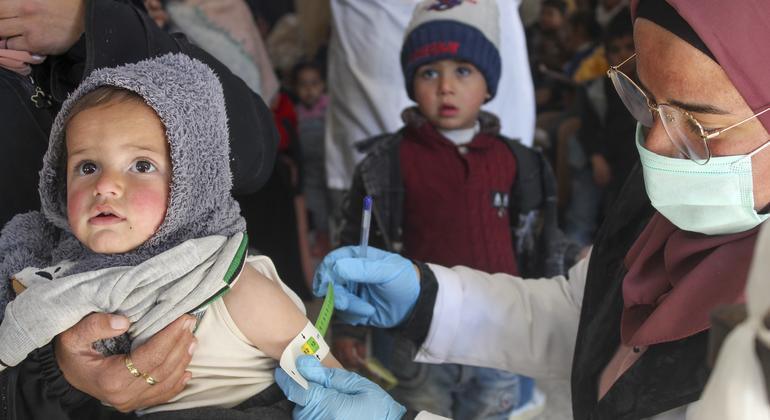He also cited rising cases of respiratory illnesses, compounded by inadequate heating, overcrowded fields and damaged infrastructure.
“There is a continued and significant increase in influenza-like illnesses (ILIs) and severe acute respiratory infections (SARIs), since the beginning of winter, with consequent increases in hospital visits and increased public health concerns,” said the Health Group.
Led by WHO, the Health Cluster coordinates the efforts of more than 900 partners around the world to address health needs in humanitarian emergencies, providing expertise, capacity development and technical guidance to ensure effective and life-saving responses in emergencies. crisis-affected regions.
Worsening conditions
Harsh winter conditions in northwestern Syria continue to exacerbate existing health vulnerabilities, especially among internally displaced people, who often reside in makeshift shelters and overcrowded camps that lack adequate insulation and heating, it added.
Public health officials also warned of increased risks, including hypothermia, as temperatures drop.
To address these issues, health partners emphasized the need for targeted interventions, including better insulated shelters, heating, and access to essential medical supplies.
Humanitarian response
The UN and its partners have also stepped up efforts to improve access to healthcare.
As of Wednesday, 750 trucks carrying aid from seven UN agencies, including the WHO and the United Nations Children’s Fund (UNICEF), crossed into northwest Syria through the Bab Al-Hawa and Bab Al-Hawa crossings. Bab Al-Salam, and 37 trucks arrived this week.
These shipments include vital medical supplies, food and other humanitarian aid.
WHO has supported 37 health centers and 14 health cluster partners with 510 trauma supply kits, treating more than 90,000 people.
The United Nations Population Fund (UNFPA) has also delivered health kits and materials to strengthen sexual and reproductive health services. Mobile mental health units continue to provide psychological support to vulnerable populations, including children and internally displaced people, in isolated areas.
To address the critical shortage, health partners such as the WATAN foundation have deployed three mobile blood banks, collecting 210 units of blood through donation drives. Other partners are also expanding their support to Aleppo hospitals, focusing on pediatric care and trauma services.
Current challenges
Despite these efforts, the health crisis in northwestern Syria remains serious.
Recent landmine explosions in Idlib, Aleppo and Hama have caused deaths and injuries, further straining the health system. On December 24, three explosions killed a man in Idlib and injured others in Aleppo, including a child.
Funding shortages are another critical concern.
The Health Group needs $22 million over the next three months to maintain essential healthcare services for 450,000 people. The severe lack of funding has left 140 health facilities at risk, including general and specialized hospitals, primary health centers and dialysis units.




